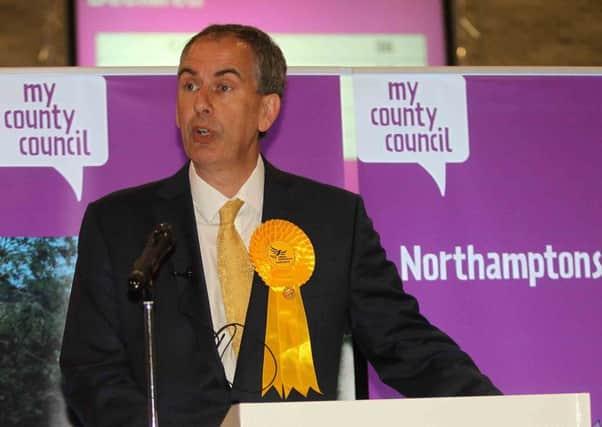The European Union: Should we stay in or leave?


Two of the county’s politicians have their say on issue to help you decide which way to vote on June 23.
LEAVE: Chris Heaton-Harris, MP for Daventry
This is the biggest political question and debate of our generation. Simply put we will decide what sort of country we want the UK to be in the future? For me the answer is simple - we need to take control – control of our borders, our economy and ultimately our future.


Advertisement
Hide AdAdvertisement
Hide AdDuring the 10 years I spent as a Member of the European Parliament I witnessed first-hand the worst of European excess and integration.
The EU institutions that truly matter when it comes to making decisions are also those that have the largest democratic deficit. The 28 Commissioners of the EU Commission, which control what ends up becoming most EU legislation, are appointed by their mates or failed politicians. These undemocratic institutions are the ones who also decide how to spend the money that we send to the EU. One of the largest anti-austerity measures this country could take would be leaving the EU. In 2014, the UK sent £11.4 billion net to the EU. Not to mention that this money that we send daily to the EU is going towards an organisation who have not had their accounts signed off in 20 years!
Then there is the tax regime imposed upon us from Brussels. The EU sets the regulations for minimum level of VAT and other taxes for goods, including the mandatory minimum of a 5% VAT levy on tampons and on your energy bills. Leaving the EU will mean that we will once again have control over these rates and determine just what goods require taxation.
When it comes to trading, a future outside the EU is not the end of the world. In fact, it allow us to break away from an organisation which has prevented us from signing deals with major trading nations, such as India and Brazil.


Advertisement
Hide AdAdvertisement
Hide AdIf you trade with Japan, you must meet Japanese standards, if you trade with any country you must first meet their standards, and the same goes for the EU. Since we have already instituted EU regulation for all of our businesses, we will be on par with all other EU countries when it comes to trading goods. The fact of the matter is that although 80% of British businesses do not export, 100% of our businesses are bound by EU red tape. This regulation costs British businesses £600 million a week!
To make matters worse, British businesses that do trade outside of the UK are facing the harsh reality of the lack of leadership displayed by the European Union. British steel factories are feeling the brunt of the ineffectiveness of the EU as they continue to fight against Chinese steel while the EU refuses to take the measures necessary to save them. Outside the EU we would be able to set our own tariffs and protect those industries that are so crucial to our economy, our security, and our country. Even trading changes and agreements that have at one time been promised
by the EU, such as TTIP, have been blocked and are seen as impossible deals now.
It a common misconception that the EU has given the UK years of peace and security. No matter the outcome on the 23rd, we must remember that the UK is, and will remain, a member of NATO and a permanent member of the UN Security Council. And we definitely need to secure and police our own borders – which is virtually impossible if we stay in the EU.
Advertisement
Hide AdAdvertisement
Hide AdSo the choice I leave you with is this- should we not be standing on our own two feet, trading and working with others, independent and strong OR should we remain stuck in the EU, a shrinking old economy, damaging and limiting our aspirations, our trade, our economy, and our security?
REMAIN: Brendon Glynane, leader of the Northamptonshire Liberal Democrat Group.
We some times forget the lessons of history and where we have come from. I remember the 1974 referendum – I was not able to vote then. If I could have voted for Europe then I would have done so, my mother and father did vote to join, they were right then and it has been proved to be the right decision for Britain. We are now the fifth richest economy in the world thanks in part to being in a market place of 550 million people, a free market of capital, free movement of people and of goods.
Remember Great Britain in the 1970s? Politicians, economists, businessmen, journalists, governments (both allies of Britain and enemies) had taken to calling Britain the “Sick Man of Europe”. We were the poorest of the major European nations in 1973, Britain’s economy had been overtaken by France, Germany and Italy and our economy had grown by £3,000 less than the average of France, Germany or Italy. In 2015 who was the richer, the average person in Germany, Italy or France or the average person in England, Scotland or Wales? The answer, it was us inside Europe. There are an estimated 3.5 million jobs in Britain which are linked, one way or another, to the UK’s trade with the rest of Europe. We’re much better off in the EU; our government’s own Department for Business, Innovation and Skills puts the overall gain to Britain at six per cent of our gross domestic product. We get to trade stuff with lots of Europeans, trade stops wars. It also makes us all a lot richer – and 50 per cent of all our trade is with the EU. All those British goods and services sloshing around the continent have brought prosperity to a continent which, let’s face it, has had a pretty ropy history.
Advertisement
Hide AdAdvertisement
Hide AdThere’s a chance your job could depend on the EU, OK, all the percentage points above might seem a little obscure. In fact they translate to something everyone can understand – jobs. There are an estimated 3.5 million jobs in Britain which are linked, one way or another, to the UK’s trade with the rest of Europe. Manufacturing would be hit especially hard if Britain left the EU, the foreign companies which own most of Britain’s car factories, for example, would shift their business overnight.
The EU has been cutting red tape. Common rules for the common market make it unnecessary to have 28 sets of national regulations.
Immigration isn’t all one-way; the free movement of people within the EU – and the huge migration to Britain that results – is at the heart of the EU debate. But our attitudes to the issue might be influenced by where we live. In Rhondda in Wales, just 0.6 per cent of the population are arrivals from the EU. At the other extreme, in Tottenham in London, 17 per cent are EU migrants. The strain on local public services is bound to be felt more there. But there’s a flipside to the migration debate which doesn’t get talked about much, the 1.4 million Brits currently living and working in the EU who might be forced to return to their homeland if we left the EU. The positive side is that people from Europe who work and pay taxes here in the UK create a surplus of £2.5 billion to our economy in cash terms.
The EU gives us consumer clout. British families enjoy lower mobile phone roaming charges, lower credit card fees, cheaper flights and proper compensation when flights are delayed or cancelled. These sorts of benefits could not be achieved by Britain alone. We have a cleaner environment through commonly agreed EU standards; national Governments have achieved improvements to the quality of air, rivers and beaches. Good for Britain and good for Britons holidaying or living abroad!
Advertisement
Hide AdAdvertisement
Hide AdThe EU has given us in Britain more influence in the world as part of a group of 28 democracies and as the world’s biggest single market, we are strong when we work together. Britain is represented in many international organisations in joint EU delegations – giving Britain more influence than it would have alone. The EU has played a major role in climate control, world trade and international development. Britain is Stronger In, I am putting Britain’s interests first so join me vote in on June 23 for a stronger voice Europe.